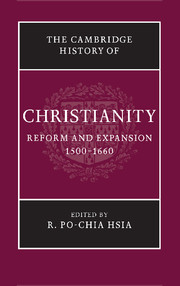Book contents
- Frontmatter
- Part I Luther and the Holy Roman Empire
- 1 Martin Luther, Reformer
- 2 Emergence and consolidation of Protestantism in the Holy Roman Empire to 1600
- 3 The Radical Reformation
- 4 Lutheranism in the Seventeenth Century
- Part II The Second Reformation
- Part III Catholic Renewal
- Part IV Resolving Confessional Conflicts
- Part V Religion, Society, and Culture
- Part VI Christianity and Other Faiths
- Bibliography
- Index
- References
2 - Emergence and consolidation of Protestantism in the Holy Roman Empire to 1600
from Part I - Luther and the Holy Roman Empire
Published online by Cambridge University Press: 28 March 2008
- Frontmatter
- Part I Luther and the Holy Roman Empire
- 1 Martin Luther, Reformer
- 2 Emergence and consolidation of Protestantism in the Holy Roman Empire to 1600
- 3 The Radical Reformation
- 4 Lutheranism in the Seventeenth Century
- Part II The Second Reformation
- Part III Catholic Renewal
- Part IV Resolving Confessional Conflicts
- Part V Religion, Society, and Culture
- Part VI Christianity and Other Faiths
- Bibliography
- Index
- References
Summary
German Protestantism began when Martin Luther’s call to reform the church, with and then against the papacy, met rejection and resistance by the Emperor Charles V, the bishops, and other rulers. The resulting evangelical movement supplied ideas and motives to allied movements in other kingdoms, some partly successful (France, Poland, and Hungary) and some generally so (England, Scotland, Denmark, and Sweden). German Protestantism was locally a success but nationally a failure, as the very condition that encouraged its survival — permanently dispersed governance — set limits to its power to spread across the Holy Roman Empire. It formed, instead, two communities of religious belief and practices, or confessions, the Lutheran and the Reformed or ‘Calvinist’. Their legal coexistence with the old church was framed in 1555 by the Religious Peace of Augsburg and revised in 1648 by the Peace of Westphalia. This outcome was essentially complete by 1600.
The emergence of German Protestantism, 1526–1552
The origins of the transformation of the evangelical movement into Protestantism lie in the middle years of the 1520s: the beginning of organized Catholic resistance in 1524, the German Peasants’ War between 1524 and 1526, and the imperial diet of Speyer in 1526. At Speyer the imperial diet (parliament) formulated the kernel of what would become the basis for a political treatment of the religious schism in the provision that each ruler should act ‘in such a way as he will be responsible to God and the emperor’.
- Type
- Chapter
- Information
- The Cambridge History of Christianity , pp. 20 - 36Publisher: Cambridge University PressPrint publication year: 2007



